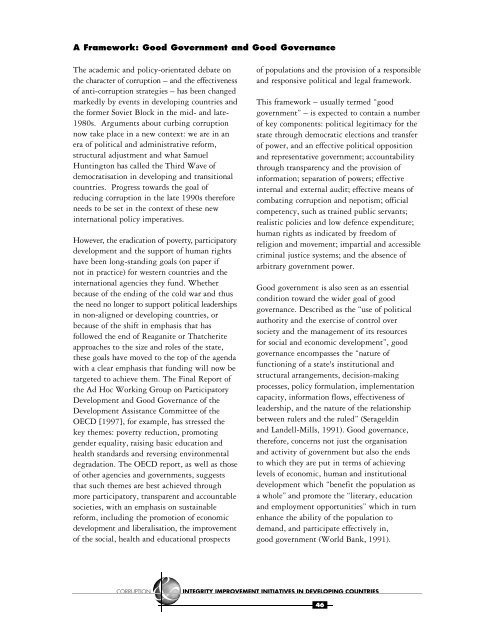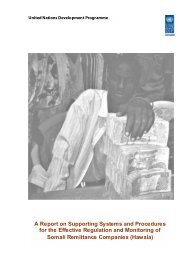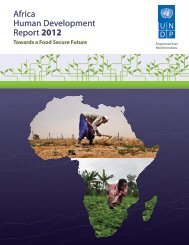CORRUPTION AND ANTI-CORRUPTION STRATEGIES ... - UNDP
CORRUPTION AND ANTI-CORRUPTION STRATEGIES ... - UNDP
CORRUPTION AND ANTI-CORRUPTION STRATEGIES ... - UNDP
Create successful ePaper yourself
Turn your PDF publications into a flip-book with our unique Google optimized e-Paper software.
A Framework: Good Government and Good Governance<br />
The academic and policy-orientated debate on<br />
the character of corruption – and the effectiveness<br />
of anti-corruption strategies – has been changed<br />
markedly by events in developing countries and<br />
the former Soviet Block in the mid- and late-<br />
1980s. Arguments about curbing corruption<br />
now take place in a new context: we are in an<br />
era of political and administrative reform,<br />
structural adjustment and what Samuel<br />
Huntington has called the Third Wave of<br />
democratisation in developing and transitional<br />
countries. Progress towards the goal of<br />
reducing corruption in the late 1990s therefore<br />
needs to be set in the context of these new<br />
international policy imperatives.<br />
H o w e v e r, the eradication of poverty, participatory<br />
development and the support of human rights<br />
have been long-standing goals (on paper if<br />
not in practice) for western countries and the<br />
international agencies they fund. Whether<br />
because of the ending of the cold war and thus<br />
the need no longer to support political leaderships<br />
in non-aligned or developing countries, or<br />
because of the shift in emphasis that has<br />
followed the end of Reaganite or Thatcherite<br />
approaches to the size and roles of the state,<br />
these goals have moved to the top of the agenda<br />
with a clear emphasis that funding will now be<br />
targeted to achieve them. The Final Report of<br />
the Ad Hoc Working Group on Participatory<br />
Development and Good Governance of the<br />
Development Assistance Committee of the<br />
OECD [1997], for example, has stressed the<br />
key themes: poverty reduction, promoting<br />
gender equality, raising basic education and<br />
health standards and reversing environmental<br />
degradation. The OECD report, as well as those<br />
of other agencies and governments, suggests<br />
that such themes are best achieved through<br />
more participatory, transparent and accountable<br />
societies, with an emphasis on sustainable<br />
reform, including the promotion of economic<br />
development and liberalisation, the improvement<br />
of the social, health and educational prospects<br />
of populations and the provision of a responsible<br />
and responsive political and legal framework.<br />
This framework – usually termed “good<br />
government” – is expected to contain a number<br />
of key components: political legitimacy for the<br />
state through democratic elections and transfer<br />
of power, and an effective political opposition<br />
and representative government; accountability<br />
through transparency and the provision of<br />
information; separation of powers; effective<br />
internal and external audit; effective means of<br />
combating corruption and nepotism; official<br />
competency, such as trained public servants;<br />
realistic policies and low defence expenditure;<br />
human rights as indicated by freedom of<br />
religion and movement; impartial and accessible<br />
criminal justice systems; and the absence of<br />
arbitrary government power.<br />
Good government is also seen as an essential<br />
condition toward the wider goal of good<br />
governance. Described as the “use of political<br />
authority and the exercise of control over<br />
society and the management of its resources<br />
for social and economic development”, good<br />
governance encompasses the “nature of<br />
functioning of a state's institutional and<br />
structural arrangements, decision-making<br />
processes, policy formulation, implementation<br />
capacity, information flows, effectiveness of<br />
leadership, and the nature of the relationship<br />
between rulers and the ruled” (Serageldin<br />
and Landell-Mills, 1991). Good governance,<br />
therefore, concerns not just the organisation<br />
and activity of government but also the ends<br />
to which they are put in terms of achieving<br />
levels of economic, human and institutional<br />
development which “benefit the population as<br />
a whole” and promote the “literary, education<br />
and employment opportunities” which in turn<br />
enhance the ability of the population to<br />
demand, and participate effectively in,<br />
good government (World Bank, 1991).<br />
<strong>CORRUPTION</strong>& INTEGRITY IMPROVEMENT INITIATIVES IN DEVELOPING COUNTRIES<br />
4 6







